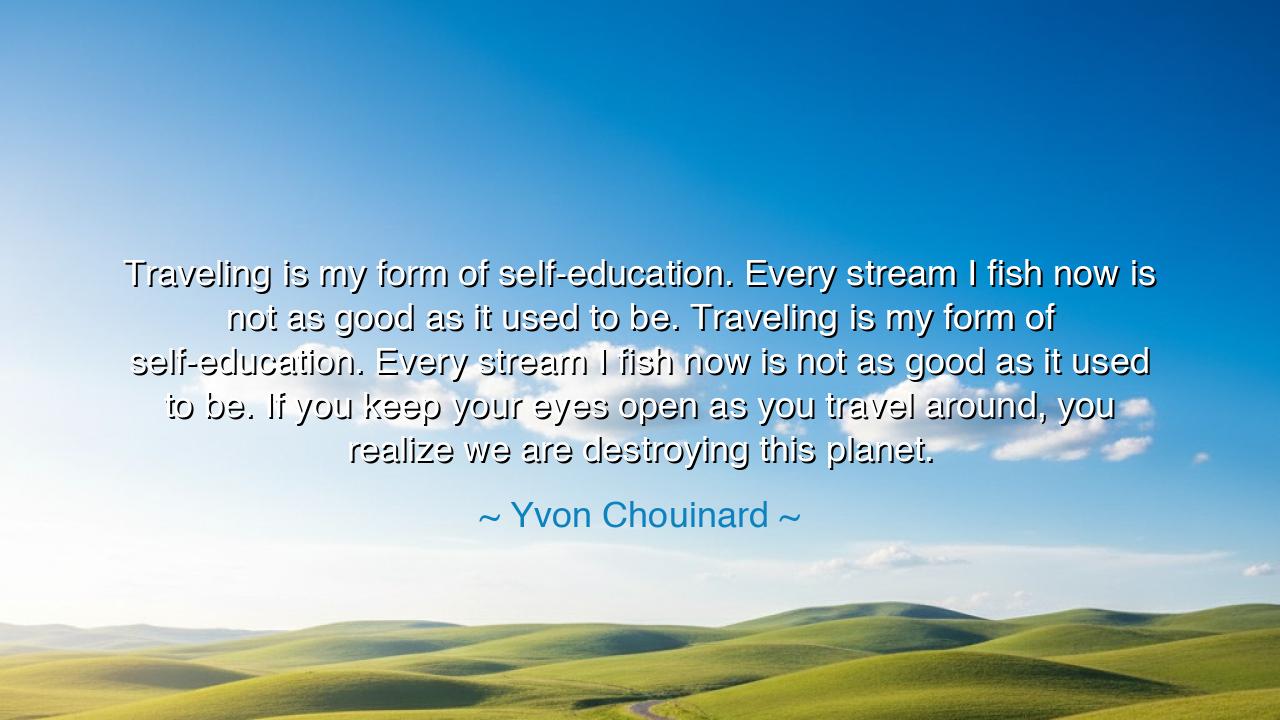
Traveling is my form of self-education. Every stream I fish now
Traveling is my form of self-education. Every stream I fish now is not as good as it used to be. Traveling is my form of self-education. Every stream I fish now is not as good as it used to be. If you keep your eyes open as you travel around, you realize we are destroying this planet.






In the words of Yvon Chouinard, adventurer, craftsman, and guardian of the wild, we hear not only personal reflection but a lament for the earth itself: “Traveling is my form of self-education. Every stream I fish now is not as good as it used to be. If you keep your eyes open as you travel around, you realize we are destroying this planet.” Here is the voice of a man who has walked among rivers and mountains, who has sought knowledge not in books alone but in the living classroom of nature, and who has returned with a sorrowful truth: that the world we inherit is being diminished by our own hands.
To call traveling a form of self-education is to claim that true wisdom is not only gathered in halls of learning but through direct experience. The ancient philosophers traveled widely: Herodotus across nations, Ibn Battuta across continents, and even the wandering monks who sought enlightenment by walking unfamiliar lands. They knew what Chouinard affirms—that to see the world with one’s own eyes is to be taught humility, perspective, and truth. And yet, unlike in ages past, the lesson of our time is harsher: that every mile walked reveals wounds upon the earth.
The image of the stream is particularly powerful. For a stream is more than water—it is a lifeline, a sanctuary for fish, a place where man has gone for refreshment, sustenance, and peace. Chouinard’s sorrow is not simply that streams are poorer for fishing, but that their decline is a sign of a greater sickness in the world. When a stream is polluted, when its fish vanish, when its flow is weakened by greed and neglect, it is not only the angler who loses but all creation. The diminished stream becomes a symbol of the diminished earth.
His words remind us of an old truth: the observant traveler always carries back warnings. When Marco Polo described lands of wealth and wonder, he brought to Europe the possibility of growth. But when modern travelers like Rachel Carson observed the dying of birds and the poisoning of waters, they brought warnings of destruction. Chouinard stands in this latter tradition: the one who journeys with eyes open, seeing clearly the fragility of nature, and sounding the alarm that we may yet awaken before it is too late.
The phrase “we are destroying this planet” is not accusation alone, but a call to responsibility. For the planet is not an enemy we conquer; it is the very ground of our being. To harm it is to harm ourselves, to rob our children of rivers to fish, forests to walk, skies to breathe. Ancient wisdom spoke of this, too. The Native American elders taught that every decision should be made with the seventh generation in mind. To live otherwise was to betray the sacred covenant between humanity and earth.
Yet Chouinard’s grief carries also a hidden strength. For to see the destruction is also to awaken to the need for guardianship. If travel is self-education, then its fruit must be action: to return not only with stories but with resolve. Just as Odysseus returned from his travels with wisdom earned through hardship, so too must we, as modern travelers, return from our journeys with lessons about what must be healed and protected. The decline of the streams is not the end, but a summons to restore them.
The lesson is clear: open your eyes when you travel, and let what you see change you. Do not close your heart to the rivers, the forests, the skies. When you witness their decline, do not despair, but act. Plant trees, protect waters, consume less, and live in reverence. Seek education not only in books but in the witness of the living earth. For the world itself is the greatest teacher, and its wounds are now its greatest lessons.
So I say to you: walk the earth with eyes open. Let your traveling shape you into a steward, not merely a passerby. When you stand at the side of a diminished stream, remember the fullness it once held, and vow to restore what has been lost. For only then will your self-education bear fruit—not only for your own soul, but for the healing of the planet that sustains us all.






AAdministratorAdministrator
Welcome, honored guests. Please leave a comment, we will respond soon